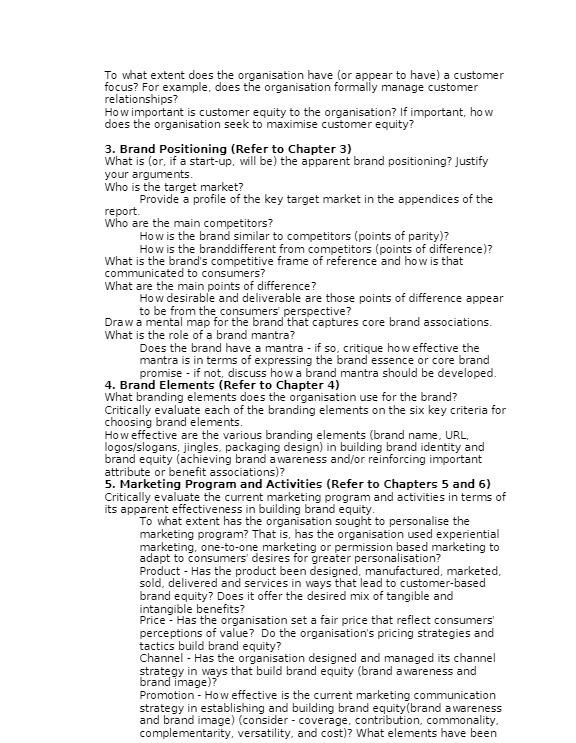Answered step by step
Verified Expert Solution
Question
1 Approved Answer
To what extent does the organisation have (or appear to have) a customer focus? For example, does the organisation formally manage customer relationships? How

To what extent does the organisation have (or appear to have) a customer focus? For example, does the organisation formally manage customer relationships? How important is customer equity to the organisation? If important, how does the organisation seek to maximise customer equity? 3. Brand Positioning (Refer to Chapter 3) What is (or, if a start-up, will be) the apparent brand positioning? Justify your arguments. Who is the target market? report. Provide a profile of the key target market in the appendices of the Who are the main competitors? How is the brand similar to competitors (points of parity)? How is the branddifferent from competitors (points of difference)? What is the brand's competitive frame of reference and how is that communicated to consumers? What are the main points of difference? How desirable and deliverable are those points of difference appear to be from the consumers' perspective? Draw a mental map for the brand that captures core brand associations. What is the role of a brand mantra? Does the brand have a mantra - if so, critique how effective the mantra is in terms of expressing the brand essence or core brand promise - if not, discuss how a brand mantra should be developed. 4. Brand Elements (Refer to Chapter 4) What branding elements does the organisation use for the brand? Critically evaluate each of the branding elements on the six key criteria for choosing brand elements. How effective are the various branding elements (brand name, URL. logos/slogans, jingles, packaging design) in building brand identity and brand equity (achieving brand awareness and/or reinforcing important attribute or benefit associations)? 5. Marketing Program and Activities (Refer to Chapters 5 and 6) Critically evaluate the current marketing program and activities in terms of its apparent effectiveness in building brand equity. To what extent has the organisation sought to personalise the marketing program? That is, has the organisation used experiential marketing, one-to-one marketing or permission based marketing to adapt to consumers desires for greater personalisation? Product - Has the product been designed, manufactured, marketed, sold, delivered and services in ways that lead to customer-based brand equity? Does it offer the desired mix of tangible and intangible benefits? Price - Has the organisation set a fair price that reflect consumers perceptions of value? Do the organisation's pricing strategies and tactics build brand equity? Channel - Has the organisation designed and managed its channel strategy in ways that build brand equity (brand awareness and brand image)? Promotion - How effective is the current marketing communication strategy in establishing and building brand equity(brand awareness and brand image) (consider - coverage, contribution, commonality. complementarity, versatility, and cost)? What elements have been
Step by Step Solution
There are 3 Steps involved in it
Step: 1

Get Instant Access to Expert-Tailored Solutions
See step-by-step solutions with expert insights and AI powered tools for academic success
Step: 2

Step: 3

Ace Your Homework with AI
Get the answers you need in no time with our AI-driven, step-by-step assistance
Get Started


